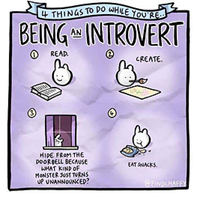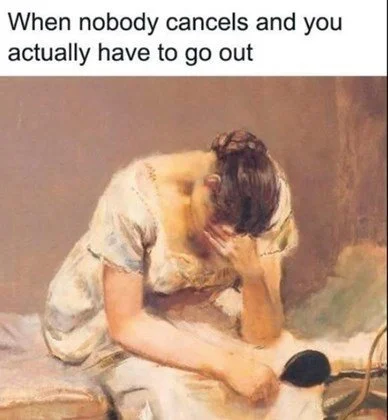An introvert’s guide to socialising
If you need alone time to recharge and often get overwhelmed or exhausted after being around people then you're quite probably an introvert. I frequently talk with introverted clients who know this about themselves but don't know how to manage it, and as a result can withdraw too much or even develop social anxiety. But introverts need to be around people too (read on for more myth busting!) - it's all about finding the right balance for you. The guidance below can help you think about what you need to do to manage your energy levels and enjoy your social time.
What is an introvert?
The terms introversion and extroversion were first popularised by psychoanalyst Carl Jung, and is widely used today in a variety of personality tests such as Myers Briggs and The Big Five.
Introversion is the preference to focus your energy on your inner world rather than external things and other people. It's important to know that introversion/extroversion is on a continuum and not two fixed points - we can also be more extroverted in certain situations (e.g. with two of your closest friends) than others.
Introverts tend to prefer meaningful conversation to chit chat, tend to be thoughtful about what they say and need time to process after social interaction.
Introvert myth busting.
Being more on the introverted side does not mean that...
you don't like being around people
you have low self esteem or anxiety (you may also struggle with this but they are not intrinsically liked to introversion)
you always want to be on your own
you're not a good leader or manager (actually the opposite can be true as introverts tend to have less people pleasing tendencies)
you are unhappy (extroverts may interpret wanting to be alone as a sign something is wrong, when for you it's actually a good thing)
you don't have/want friends - we are social animals and connection is vital for all of us. Introverts just have less capacity for prolonged social interaction and tend to have a few close friends rather than a large friendship group
you don't get on with extroverts - it's unhelpful to make these sort of judgements, it's all about the individual in question. And there's a lot of truth in the saying 'opposites attract'!
Manage your energy!
If you are more introverted than extroverted you need to manage your energy so you don't get burnt out or overwhelmed. The following guidance is based on my own experiences and what has worked for many of my counselling clients - you must find out what works for you.
Step one: acceptance
The first thing is to meet yourself where you are. If you're an introvert - accept it. There is absolutely nothing wrong with you. If it feels like a problem that's usually because of the expectations others have placed on you that you've internalised or because you're not managing your energy and getting exhausted all the time. Self acceptance allows us embrace ourselves as we are and find ways to thrive.
Step two: check your energy levels regularly
You can use a visual image, like the battery icon on your phone, to ask yourself what your energy levels are like throughout the day. If you notice you're running low - take action: find a way to recharge as soon as you can, don't wait until you're running on fumes.
Step 3: don't give more than you need to.
Sometimes we can feel that we need to play a certain role or be a certain way in relationships, which can be very tiring. Be mindful of how much energy you're giving to others when you're with them, it might be more than is necessary. Don't try to 'fix' others or work too hard to meet their expectations. Try to relax and give yourself permission to just be.
Step 4: set boundaries.
Learn to set time boundaries with social interactions - a whole day might be too much, so don't put yourself in that situation if you can help it. Organise to spend time with people in smaller chunks of time and communicate your availability in advance e.g. "hey, I'm free for a few hours Saturday morning, do you fancy going for a walk and getting a coffee?" or "thank you for the invite, I'd love to come! I'll need to leave at 9pm, I hope that's ok."
Step 5: don't do too many things at once.
You can have too much of a good thing - if you work with people in the day time and schedule social events two evenings in a row you might find yourself struggling by the third day. It's not always possible, but when you can don't have too many social events in a row - you can even book out time in your diary so you don't overfill it.
Step 6: create pockets of peace.
If you're with people for an extended amount of time - at work, on a group holiday, a long day out etc - find little moments where you can breathe and reset. You might say "I'm going for a little walk by myself, I'll be back to help make dinner later." Sometimes extra trips to the bathroom just to sit alone for a few minutes is the best we can do - take what you can!
Step 7: plan recharge time.
If you've had a very peopley time then your energy levels will be low - even if you've really enjoyed yourself. Don't make the mistake of having unrealistic expectations of yourself - plan in time to recharge and have some quiet, alone time as soon as you can. A client of mine found it to be a revelation when he started giving himself the day off after big events like family gatherings - previously he'd been unfocused and then frustrated at work the next day, now he takes time to recharge and comes back ready to get things done.
In summary: own your introverted nature so you can work with yourself, not against.
Final note:
Take the advice that feels relevant to you and try it out, I hope it helps! Sometimes we need more than general guidance - if you'd like to talk about this in more detail on a personal level you can contact me to arrange a counselling session: natalierossiterwellbeing@gmail.com






